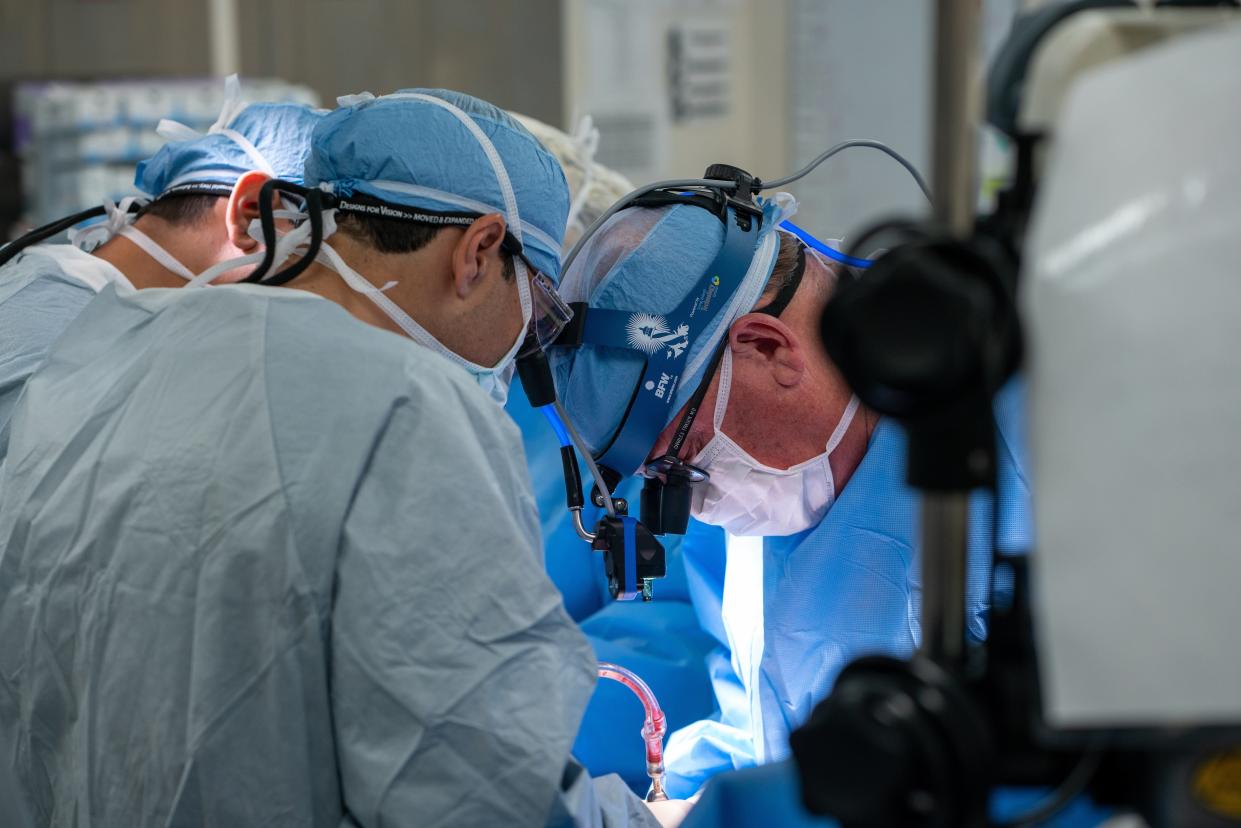Ascension Texas, University of Texas team up to create institute for cardiac care, research

Central Texas hospital system Ascension Texas and the University of Texas have launched a new Institute for Cardiovascular Health.
The institute won't be a physical building with dedicated employees. Instead, it's a collaboration of ideas between researchers at the university and pediatric and adult cardiologists working in clinics and hospitals.
It is designed to bring more clinical trials and research to Central Texas, as well as develop new technologies and techniques in cardiac care.
The institute doesn't have a specific investment amount with it, said Dr. Charles Fraser Jr., who will be its executive director, but does represent a continued focus on cardiac care by the hospital system and the university.
"The primary goal is coordinated care for the continuum of life," said Fraser, who leads the Texas Center for Pediatric and Congenital Heart Disease at Dell Children's Medical Center.
Currently, cardiac care is divided according to the age of the patient, and often pediatric and adult cardiologists are siloed.
"Our thinking about cardiovascular disease is it starts in gestation and continues, with our life expectancy, to nonagenarians," Fraser said. "Our goal is to be able to think about the longitudinal well-being of families."
The program will bridge care done at Dell Children's at both the new Comprehensive Fetal Care Center and the new Texas Center for Pediatric and Congenital Heart Disease, and at the adult level at Ascension Texas hospitals and the Ascension Seton Heart Institute.
Dr. Mark Pirwitz, president and CEO of the Ascension Seton Heart Institute, will continue to lead the adult cardiac care. Dr. Kenneth Moise and Dr. Michael Bebbington lead the Comprehensive Fetal Care Center.
Fetal care in Central Texas: 'A huge advance': Dell Children's performs first fetal surgery on Austin mom expecting twins
"Heart disease is a serious national issue, and to address it requires a complex, collaborative effort," said Andy Davis, president and chief executive officer of Ascension Texas. “... Through our collaboration with the medical school and UT-Austin, we will combine the existing expertise of Ascension Texas cardiologists to create a model that will truly be a world-class, integrated academic system of heart care."
The new institute will bring together what doctors are doing in clinical practice with what is happening at the University of Texas, including its Dell Medical School, where many of these doctors are also professors and work at its clinical arm, UT Health Austin.
It will create a more integrated approach to research that will filter into improved patient care.
The collaboration, said Dr. George Macones, the interim dean of Dell Medical School, "will create a simply outstanding educational and research environment that will promote the discovery of new knowledge from the laboratory bench, to the bedside, while facilitating the training of tomorrow’s clinician leaders."
Adding programs: Statesman exclusive: Gift of a kidney launches new Austin transplant program
It also will allow for more cross-training of pediatric and adult cardiac staffers, including the nursing staff. "The pandemic and other forces have shown how fragile we all are, and one of our most burdened professional groups is our nursing colleagues," Fraser said.
During the pandemic, the adult and pediatric sides have been sharing nursing resources to some extent out of necessity. Continued cross-training could help the nurse who has been in the intensive care unit day after day with a sick child, he said. "They don't have any potential breathing room."
This will increase the number of health care providers, he said, "where we can help each other."
The institute also could provide more training opportunities, such as post-residency cardiothoracic fellowships for doctors, which Austin doesn't have right now, as well as training in pharmacy, respiratory support, executive administration, nursing and transplant teams. Dell Children's began its heart transplant program in October 2020 and has now done 12 transplants. Ascension Seton has had a heart transplant program since 1986.
Building a program: In first year of heart transplants, Dell Children's finds niche in cases other hospitals pass on
As a collaboration between UT and Ascension Texas, "we are attracting some of the finest medical talent in the world to come to Austin," university President Jay Hartzell said. "These are people who have committed themselves to improving the lives of others, who are making an incredible positive impact on our community, and who will permanently change the availability of world-class cardio care in Central Texas.”
The institute doesn't come with a set number of specialists it will recruit, but Fraser said, "Five years from now, there's going to be a lot of new people here. ... We know we can offer a special educational opportunity. People want to come here and be exciting and cutting-edge."
Adding programs: Ascension Seton building eight-story women's tower to expand care in Central Texas
This article originally appeared on Austin American-Statesman: University of Texas, Ascension team up on cardiac research institute

